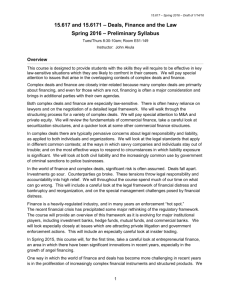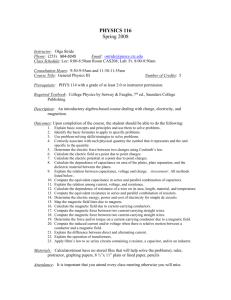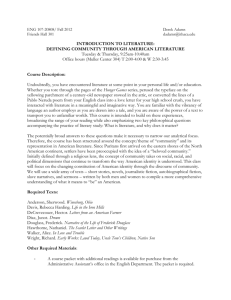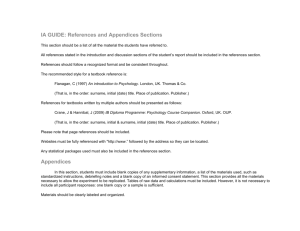First-Year Learning Community (FLC) 658 - Psychology
advertisement
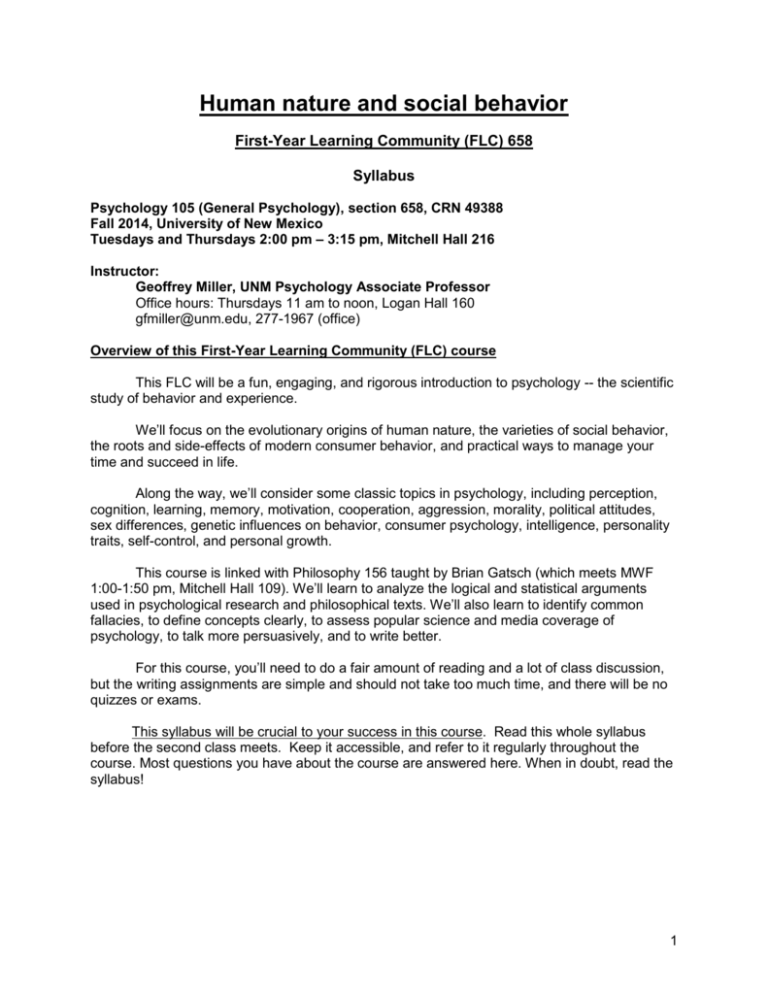
Human nature and social behavior First-Year Learning Community (FLC) 658 Syllabus Psychology 105 (General Psychology), section 658, CRN 49388 Fall 2014, University of New Mexico Tuesdays and Thursdays 2:00 pm – 3:15 pm, Mitchell Hall 216 Instructor: Geoffrey Miller, UNM Psychology Associate Professor Office hours: Thursdays 11 am to noon, Logan Hall 160 gfmiller@unm.edu, 277-1967 (office) Overview of this First-Year Learning Community (FLC) course This FLC will be a fun, engaging, and rigorous introduction to psychology -- the scientific study of behavior and experience. We’ll focus on the evolutionary origins of human nature, the varieties of social behavior, the roots and side-effects of modern consumer behavior, and practical ways to manage your time and succeed in life. Along the way, we’ll consider some classic topics in psychology, including perception, cognition, learning, memory, motivation, cooperation, aggression, morality, political attitudes, sex differences, genetic influences on behavior, consumer psychology, intelligence, personality traits, self-control, and personal growth. This course is linked with Philosophy 156 taught by Brian Gatsch (which meets MWF 1:00-1:50 pm, Mitchell Hall 109). We’ll learn to analyze the logical and statistical arguments used in psychological research and philosophical texts. We’ll also learn to identify common fallacies, to define concepts clearly, to assess popular science and media coverage of psychology, to talk more persuasively, and to write better. For this course, you’ll need to do a fair amount of reading and a lot of class discussion, but the writing assignments are simple and should not take too much time, and there will be no quizzes or exams. This syllabus will be crucial to your success in this course. Read this whole syllabus before the second class meets. Keep it accessible, and refer to it regularly throughout the course. Most questions you have about the course are answered here. When in doubt, read the syllabus! 1 Required books Most introductory psychology textbooks are about 800 pages long, cost over $100, aren’t much fun to read, and cover a lot of out-dated material. For this course, I’ve selected four required books that are more engaging, more fun to discuss, and more up-to-date. Also, they add up to only about $50. Steven Pinker (2003). The blank slate. 530 pp. $11 paperback or kindle. Geoffrey Miller (2010). Spent: Sex, evolution, and consumer behavior. 380 pp., $11 paperback or kindle. Edward Humes (2013). Garbagology: Our dirty love affair with trash. 324 pp. $12 paperback or kindle. Kelly McGonigal (2013). The willpower instinct. 270 pp, paperback $13, kindle 10. You must buy them all, but the most important one to get first is The Blank Slate by Steven Pinker, which includes the readings for the first few weeks. They’re all available at the UNM bookstore. But you could probably find the last three cheaper, used, on amazon.com. Notes on the readings Important: assigned readings before each class will probably take you about one to two hours. If you cannot commit to doing these readings conscientiously, you won’t learn much in this course, and you won’t get a good grade. After each reading assignment (in the course schedule later in this syllabus), I give the page count for the actual text you’ll need to read, so you can plan your study times. Read when you’re awake and attentive. Read assignments in plenty of time before the class when they’ll be discussed. Take notes on them. Digest them. Be ready to discuss them with your peers in class. Bring the book containing each class’s readings to class with you, so you can refer to it during discussions. It’s helpful to use underlining to mark key ideas and findings, so you can locate them quickly. In my experience, it’s a lot easier to read and refer to the physical book than to an ebook – and I don’t want you using electronic devices in class anyway. Class structure In class, we’ll have a combination of discussions, activities, exercises, writings, and minilectures. There will be a 5-minute minute break near the middle of each class – mostly so you can check Facebook. ;) Class rules Your classmates deserve your civility, respect, and cooperation. Many UNM students have worked hard to get to this university, work hard to get the grades and pay the tuition to stay here, and have many conflicting responsibilities, such as part-time work, children, spouses, dependent relatives, volunteer work, sports, etc. UNM tuition rates are about $285 per credithour for NM residents, so this 3 credit-hour class costs about $855, or about $30 for each of our 30 class meetings; for non-NM-residents, it’s over $75 per class. Please appreciate how much your classmates are paying to be here, and the sacrifices they have made to attend UNM. To 2 help everybody learn as much as they can from this course, there are some class rules, which I enforce strictly: Do not arrive late. Each class starts promptly at 2:00 pm. It is best to have a seat and be ready for class by 1:55 pm. Learn how long you’ll need to find parking. Do not leave early. Each class ends at 3:15. Do not start to pack up your notes and books before that time, unless I say we’ve finished early, or you have a genuine emergency. Do not come to class if you are too tired, ill, hung over, etc. to pay attention and participate properly; do not come if you have a cold or flu and are likely to be infectious. I will excuse absences for illness with a doctor’s note. Get your rest and stay healthy. Turn off your mobile phones and other electronics in class (except during the breaks). Do not use them to call, text, facebook, or web-surf. If you have special circumstances, like you must remain available for a child or other dependant, set your phone to vibrate and go outside the classroom to take any urgent call. Eat something before class. Hungry students can’t pay attention. Your brain needs a good, steady supply of protein, fat, and complex carbohydrates to work properly. The cafe in Mitchell Hall sells some food, but it’s not very good. Better to eat first at the Student Union Building. (Sahara cafe is pretty healthy) Do not chew gum or eat in class. Chewing gum would interfere with your ability to talk clearly during discussions. Nobody wants to see or smell your food. It’s OK to bring drinks (coffee, water bottles). If you have a disability, I will try to accommodate your needs. Please send an email explaining your situation. The UNM Accessibility Office is good at organizing assistive technology, reading and note-taking services, and so forth. During peer discussions, be thoughtful, respectful, and constructive. Be polite, openminded, and inclusive. Discuss issues based on theories and evidence, not personal anecdotes and opinions. Grades You can get a very good grade in this course if you keep up with the readings, think about them, attend class regularly, and participate as best you can. Your grade for this course will depend on two things; each will be worth 50% of your total grade: 1) Class participation and attendance: I’ll assess your contributions in each class, graded on a 0-5 scale: 0 = absent or silent; 5 = fully engaged and informed Criteria: o Are you showing up regularly – awake, alert, and engaged? o Have you clearly done the readings? o Do you contribute good points in the class discussions? o Do you participate thoughtfully and actively in the class activities? About once a month I’ll let you know how you’re doing 2) Weekly short essays: Concise, tightly focused essays No more than half a page, single-spaced (about 250 words) Due every Thursday at the beginning of class, starting the second week of class 3 You’ll write a total of 13 of these short essays during this term – and I hope you’ll see a significant improvement in your writing Print them out in black Arial 11-point font on normal white 8.5” x 11” paper I’ll grade these on a 0-5 scale: 0 = didn’t turn it in; 5 = insightful and well-written Your full name must be at the top Under your name, include a specific, descriptive title that’s a complete sentence, and that states exactly what point your short essay will make. o Examples of good titles: Pinker’s description of moral taboos is too liberally biased Darwinian aesthetics can’t explain why Electronic Dance Music is so popular Miller’s credentialism model applies more to the Ivy League than to state universities McGonigal overlooks Kurzban’s recent critique of the willpower depletion research o Examples of bad titles: Moral taboos and political attitudes Music instincts and DeadMau5 Harvard, sure, but what about UNM? And yet I still have self-control in the evenings ... Make thoughtful, scholarly arguments based on the readings and class discussion. Choose any topic from that week’s readings and discussion issues that interests you. These essays should NOT just summarize, review, or paraphrase some part of the readings or class content. You should present your own logical, thoughtful arguments for or against a particular claim. You should refer to specific terms, ideas, theories, and findings from psychology – in ways that show you clearly understand them. These essays should be clearly written in University-level English, with proper grammar and spelling, showing evidence that you’ve written them carefully and proof-read them before printing them out and turning them in. Provisional Course Schedule: Readings and topics for each class Note: This class is an experiment. I’ve taught more than 25 psychology classes at UNM, but this is the first time I’ve taught Psych 105, and the first time I’ve taught an FLC. Depending on how well you do with the readings and discussions, I might revise the schedule, add or drop readings, or change the schedule around in other ways. I’ll try to give you plenty of advance notice about any changes. 1: Tues Aug. 19 No readings required before the first class Introduction to the course -------------------------------------------Before the second day of class: Read this syllabus carefully! In The Blank Slate, read: Preface, pp. vii-xii (skip acknowledgements), 5 pp total Part 1 Intro:, pp. 1-3, 3 pp total Chapter 1: The official theory, pp. 5-13, 8 pp total 2: Thurs Aug. 21 Introduction to human nature 4 -------------------------------------------In The Blank Slate, read: Chapter 2: Silly putty, pp. 14-29, 15 pp total 3: Tues Aug. 26 Intellectual history of the blank slate doctrine vs. ‘human nature’ -------------------------------------------In The Blank Slate, read: Chapter 12: In touch with reality, pp. 197-218, 23 pp total Short essay 1 due in class 4: Thurs Aug. 28 Perception, concepts, categories, and stereotypes -------------------------------------------In The Blank Slate, read: Chapter 13: Out of our depths, pp. 219-240, 22 pp total 5: Tues Sept. 2 Cognitive modules: intuitive physics, biology, psychology, etc. -------------------------------------------In The Blank Slate, read: Chapter 14: The many roots of our suffering, pp. 241-268, 28 pp total Short essay 2 due in class 6: Thurs Sept. 4 Social evolution, cooperation, conflict, nepotism, groups, empathy -------------------------------------------In The Blank Slate, read: Chapter 15: The sanctimonious animal, pp. 269-280, 12 pp total 7: Tues Sept. 9 Moral psychology, self-conscious emotions, taboos -------------------------------------------In The Blank Slate, read: Chapter 16: Politics, pp. 283-305, 23 pp total Short essay 3 due in class 8: Thurs Sept. 11 Political psychology, Utopian vs. Tragic visions of society -------------------------------------------In The Blank Slate, read: Chapter 17: Violence, pp. 306-336, 31 pp total 9: Tues Sept. 16 Aggression, violence, warfare -------------------------------------------In The Blank Slate, read: Chapter 18: Gender, pp. 337-371, 34 pp total Short essay 4 due in class 10: Thurs Sept. 18 Sexual psychology, sex differences, gender, feminism, sexual coercion -------------------------------------------In The Blank Slate, read: Chapter 19: Children, pp. 372-399, 29 pp total 11: Tues Sept 23 Developmental psychology, behavior genetics, parenting, peers 5 -------------------------------------------In The Blank Slate, read: Chapter 20: The Arts, pp. 400-420, 21 pp total Short essay 5 due in class 12: Thurs Sept. 25 Psychology of visual arts, story-telling, and literature -------------------------------------------In Spent, read: Chapter 1 & 2, pp. 1-36, 36 pp total 13: Tues Sept 30 Introduction to consumer behavior -------------------------------------------In Spent, read: Chapter 4, pp. 52-70, 18 pp total Short essay 6 due in class 14: Thurs Oct. 2 Marketing, self-display, and consumer narcissism -------------------------------------------In Spent, read: Chapter 6, pp. 90-111, 21 pp total 15: Tues Oct. 7 Signalling theory and person perception -------------------------------------------[Thurs Oct. 9: No class: Fall break] -------------------------------------------In Spent, read: Chapter 7, pp. 112-127, 15 pp total 16: Tues Oct. 14 Signalling principles: conspicuous waste, precision, and reputation -------------------------------------------In Spent, read: Chapter 9, pp. 144-170, 26 pp total Short essay 7 due in class 17: Thurs Oct. 16 Introduction to individual differences: the Central Six traits -------------------------------------------In Spent, read: Chapter 11, pp. 187-206, 20 pp total 18: Tues Oct. 21 General intelligence and education -------------------------------------------In Spent, read: Chapter 13 pp. 225-239, 15 pp total Short essay 8 due in class 19: Thurs Oct. 23 Conscientiousness and self-control -------------------------------------------In Spent, read: Chapter 14, pp. 240-254 (15 pp): 20: Tues Oct. 28 Agreeableness, kindness, and empathy, vs. psychopathy 6 -------------------------------------------In Garbology, read: Introduction: 102 Tons, pp. 1-16, 16 pp total Chapter 8: Decadence now, pp. 158-184, pp. 28 pp total Short essay 9 due in class 21: Thurs Oct. 30 What our trash reveals about human nature -------------------------------------------In Garbology, read: Chapter 12: Put-downs, pickups, and the power of no, pp. 268286, 18 pp total Epilogue, pp. 287-295, 8 pp total 22: Tues Nov. 4 Psychology, public policy, and environmental issues -------------------------------------------In The Willpower Instinct, read: Introduction, pp. 1-8, 8 pp total Chapter 1, pp. 9-29, 20 pp total Short essay 10 due in class 23: Thurs Nov. 6 Introduction to the science of self-control -------------------------------------------In The Willpower Instinct, read: Chapter 2, pp. 30-54, 24 pp total 24: Tues Nov. 11 Origins and nature of willpower -------------------------------------------In The Willpower Instinct, read: Chapter 3, pp. 55-80, 25 pp total Short essay 11 due in class 25: Thurs Nov. 13 Depletion and renewal of self-control -------------------------------------------In The Willpower Instinct, read: Chapter 4, pp. 81-106, 25 pp total 26: Tues Nov. 18 Moral licensing, adaptive self-deception -------------------------------------------In The Willpower Instinct, read: Chapter 5, pp. 107-133, 27 pp total Short essay 12 due in class 27: Thurs Nov. 20 Subjective well-being; desire vs. fulfillment -------------------------------------------In The Willpower Instinct, read: Chapter 6, pp. 134-155, 22 pp total 28: Tues Nov. 25 Stress, guilt, and giving in -------------------------------------------[Thurs Nov. 27: No class: Thanksgiving break] 7 -------------------------------------------In The Willpower Instinct, read: Chapter 7, pp. 156-183, 27 pp total 29: Tues Dec. 2 Discounting, delay of gratification, foresight -------------------------------------------In The Willpower Instinct, read: Chapter 9, pp. 209-235, 26 pp total Chapter 10, pp. 236-238, 3 pp total Short essay 13 due in class 30: Thurs Dec. 4 Getting from “I won’t” to “I will” -------------------------------------------[Dec. 8-12: UNM Final exams. No exam in this class] 8



